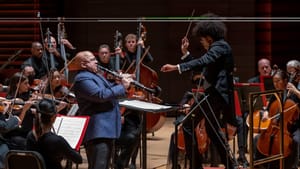Stay in the Loop
BSR publishes on a weekly schedule, with an email newsletter every Wednesday and Thursday morning. There’s no paywall, and subscribing is always free.
Rafael and Ricardo
The Philadelphia Orchestra presents Rafael Payare

Some conductors put a deeply personal stamp on whatever music they interpret. Others focus on drawing out the particular characteristics of the orchestras they lead. In his debut with the Philadelphia Orchestra, Rafael Payare fell into the latter category.
The Venezuelan maestro came to Philly on a raft of positive attention, and the crowd in Verizon Hall on the final night of his three-performance run was the largest I’ve seen since in-person performances resumed last month. Currently music director of the San Diego Symphony, Payare takes the reins of the Montreal Symphony beginning next season, and he’s appeared as a guest conductor with orchestras around the globe. He often leads concerts featuring his wife, the star cellist Alisa Weilerstein, as soloist.
Dvořák, Berlioz, and Bancks
The evening featured the premiere of Clarinet Concerto by Jacob Bancks, which the Philadelphia Orchestra co-commissioned with two unlikely partners—the Quad City Symphony Orchestra of Davenport, Iowa, and the United States Marine Band Chamber Orchestra. The unveiling was sandwiched between familiar works by Berlioz and Dvořák, following the traditional “overture, concerto, symphony” structure.
Dvořák’s Symphony No. 7 in D Minor requires a distinct interpretive vision and a lot of musical shaping to cohere. The Czech composer balances the folk rhythms of his homeland with motifs that call to mind German Romanticism, and these alternate characteristics often fight each other within the same movement. Without a sense of forward momentum from the thickly orchestrated, darkly colored beginning onward, this composition can feel oddly shapeless and thematically meandering.
In general, Payare didn’t bring order to the whole. Instead, the symphony emerged as a cathedral of sound, almost Brucknerian. He drew upon the quintessential lushness of the Philadelphia sound in the menacing first movement, but balances between the minor-key expression of the low strings and the lilting violins sounded off. The woodwind serenades of the second movement seemed buried beneath a collective roar, and the country dance of the third was taken a touch too slowly—odd for an interpretation that elsewhere gave the impression of a runaway train. The orchestra itself played with spirit and refinement, but this listener longed for a touch more narrative cohesion.
Berlioz took it upon himself to impose a storyline on his Roman Carnival overture, an example of the programmatic musical style that he championed. It can be hard to hear much plot in a piece that sounds designed to exploit every bell and whistle in an orchestra’s arsenal. There were moments where something more than pure music was evident, though—the extended English horn solo line at the very beginning, played sensitively here by Elizabeth Starr Masoudnia, gives voice to the thrill of young love; and the heavy presence of timpani suggests a carnival of chaos. Payare had the corps playing brilliant, ringing tuttis, but the overall impact was one of technique rather than passion.
Expect a quick return
Bancks’s Clarinet Concerto highlighted the skill and artistry of Ricardo Morales, the orchestra’s principal clarinetist. Across three movements that unspool in a single, unbroken stream, Morales shifted effortlessly from punchy staccato notes to luscious legato, which devolved often into bebop-like distortions of melody. He handled everything the composer threw at him with absolute poise, but more importantly, he produced a truly gorgeous sound, chestnut-colored and pliable to the music’s needs.
Rather than traditional markings, Bancks gave each of the movements a title. The inner movement, “Tender,” is the most distinctive, with Morales’s mellow sound soaring above a cascade of shimmering, almost Straussian strings. The other two movements, “Unruly” and “Defiant,” shared a frustrating sameness that was buffeted by agitated, discursive percussion. The 25-minute work could easily lose half its length and make the same impression. Payare, too, could do more to draw out the subtle differences.
Although the evening felt occasionally tedious to me, I was clearly in the minority. The audience leapt to its feet after each selection, and Payare earned the kind of ecstatic ovations usually reserved for beloved hometown maestro Yannick Nézet-Séguin. I expect he’ll be invited back, and quickly. I hope next time he’ll think more outside the box.
What, When, Where
The Philadelphia Orchestra. Rafael Payare, conductor. Ricardo Morales, soloist. Berlioz, Roman Carnival overture; Bancks, Clarinet Concerto; Dvořák, Symphony No. 7 in D Minor. $10-$169. November 11-13, 2021, at the Kimmel Center’s Verizon Hall, 300 S. Broad Street, Philadelphia. (215) 893-1999 or philorch.org.
The Kimmel Center requires all attendees aged 12 years or older to be fully vaccinated against Covid-19. Attendees aged younger than 12 years must provide a negative test taken within 72 hours of the performance. Masks are required at all times. Seating is not distanced.
Accessibility
The Kimmel Center is an ADA-compliant venue. Patrons can purchase wheelchair seating or loose chairs online by calling Patron Services at (215) 893-1999, or by emailing [email protected]. With advance notice, Patron Services can provide options for personal care attendants, American Sign Language, Braille tickets and programs, audio descriptions, and other services.
Sign up for our newsletter
All of the week's new articles, all in one place. Sign up for the free weekly BSR newsletters, and don't miss a conversation.

 Cameron Kelsall
Cameron Kelsall